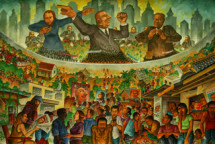Ideas into movement
Boost TNI's work
50 years. Hundreds of social struggles. Countless ideas turned into movement.
Support us as we celebrate our 50th anniversary in 2024.

What are the dilemmas faced by peasant social movements in the face of the dichotomy between "progressive governments" and the rise to power of the new authoritarian and "populist" rights?

Starting with a background review of the recent history of clsss struggle in Latin America and the subsequent rise and mixed record of “Progressive” governments, this paper highlight how the rural has been reconfigured in the contexts of resistance in the countryside and the disputes between different political projects within the State. To this end, it analyses the case of the Landless Workers Movement (MST) of Brazil, which puts forth Popular Agrarian Reform and so-called Educação do Campo (education by and for the countryside), we are both theoretical-epistemic concepts and elements in an historical project of struggle and knowledge. Both are proposals in the dispute for an alternative political project for the Brazilian countryside, and are articulated with the forging of a political subject and an intellectual and moral reform, to give landless peasants the political education and formation needed to organize and transform their own realities through struggle. The MST shares a common social and political struggle, linked to the agrarian question, with other Latin American peasant and indigenous peoples organizations, in the defense of territories and as an emancipatory political project for the countryside and its peoples. For them, education is the way to forge a subject capable of achieving its own emancipation.
This is followed by an analysis of the case of the MST and these proposals under two key scenarios of recent political history: the first is within the framework of the so-called "progressive" governments, characterized by an opening of the public policy arena to peoples’ movements, while at the same time, and in a contradictory way, to the private sector. The second scenario is the rise, through a parliamentary coup d'etat, of the "traditional" right and the "new” authoritarian and populist right in Brazil, who are currently engaged in an offensive to roll back the historic gains of the working class and the peasantry.
It reflects on the partial achievements and the setbacks of the MST under the previous "friendly governments", and how they now face the authoritarian right, literally canceling core budgets for Agrarian Reform and Educação do Campo. This section emphasises that these tendencies actually began before the (re)ascent of the right, under the governments of Presidents Luiz Inácio Lula da Silva and Dilma Rousseff, who to a certain extent laid the groundwork for the return of the right, by failing to resolve the structural and political contradictions of the country, and by facilitating extraordinary access by agribusiness and financial capital to rural areas and government programs.
This represents a complex scenario for the MST and other rural social movements. On the one hand they are participating in popular fronts against the coup and against fascism, while on the other hand, they are stuck in the contradictory position of demanding the return to power of the same actors whose failures set the stage for the (re)ascent of the right(s), both old and new. This is not very different from the contradictions present more generally in the region under the governments of the progressive left. The final section summarises and problematises what the recent political experience in Brazil shows, at a more general level, with respect to advances, ruptures, articulations, complementarities and continuities in the exercise of democracy, from a popular perspective associated with emancipatory social struggles. It further analyses the reconfiguration of the agrarian question and the role of the peasantry in the hegemonic dispute under the progressive governments and, above all, in the current context of confrontation with the (re)ascent of the right(s) and of authoritarian populism in the contexts of coups and/or of crises in the direction of progressive governments.
This paper was presented at the Emancipatory Rural Politics Initiative (ERPI) 2018 Conference: "Authoritarian Populism and the Rural World"